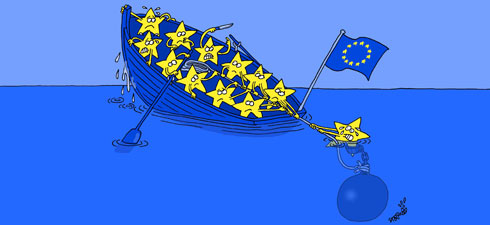All Cretans are liars, says the Cretan philosopher Epimenides. Epimenides’ paradox, a paragon of irresolvable circular logic, sounds even nastier as rehashed in Saint Paul’s Epistle to Titus: “One of Crete’s own prophets has said it: ‘Cretans are always liars, evil brutes, lazy gluttons.’” The paradox has now taken a political turn: everyone is aghast that the Greeks lied. That they are living above their means, incurring more debts than they’ll ever be able to repay, and counting on the rest of Europe – or more precisely, part of the rest of Europe – to foot the bill. Not unlike all those banks that put Greek bonds in their portfolio, presumably on the assumption that a state can go bankrupt, but not an EU member.
But this whole hullabaloo itself is part of the lie. We’re all Cretans, at least as far as lying is concerned, though not so much in matters of self-incrimination. Athens has to keep on economising, Europe says. But there isn’t a single European state that doesn’t leave its taxpayers in the dark about its fiscal situation. Nor is there a single people that doesn’t sanction cash for clunkers, tax-cutting pipedreams and euphemisms for the government’s running up new national debts. People make a bit of a fuss now and then, but that’s all. And there isn’t a politician who would not stoop to the cheapest tricks in the run-up to elections – like the one now in North Rhine-Westphalia – to lead taxpayers right up the garden path and into the polling booth.
**This content has been removed under request of the copyright owner.**
Germany
Merkel and judicial review
The political decision is no longer in doubt: Greece is going to be saved by her European partners. "But the real obstacle could lie elsewhere,” points out the FAZ. It seems that four foes of the euro are going to appeal to the German Constitutional Court, already notorious for its June 2009 ruling on the Lisbon Treaty. "Berlin has been reckoning with that attack for a long time,” concedes the German daily. "But the stormy public debate has ignored the paramount role constitutional issues play in Germany’s stance on Greece."
Angela Merkel’s government is trying harder than any of its predecessors to hammer out a policy that will stand up to judicial review in Karlsruhe. Its strategy to defend the Greek bailout, at odds with article 125 of the Treaty on the Functioning of the EU, consists in asserting there is no other way to avert harm to the German people (as per article 56 of the FRG’s Basic Law), in this case owing to the instability of the single currency and the risk of the insolvency of German banks and insurers. "Hence the position of the government, which qualifies the bailout as an ultima ratio,” notes the FAZ. "Hence the involvement of the IMF” as a last resort. "It turns out,” concludes the FAZ, “that in certain matters, Berlin is subject to judicial review when it comes to taking action in Brussels."
Do you like our work?
Help multilingual European journalism to thrive, without ads or paywalls. Your one-off or regular support will keep our newsroom independent. Thank you!
















